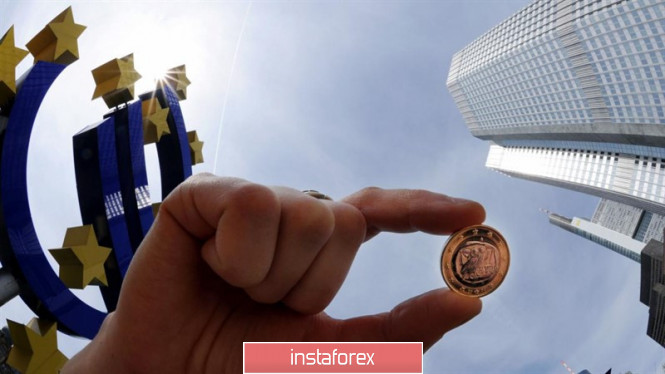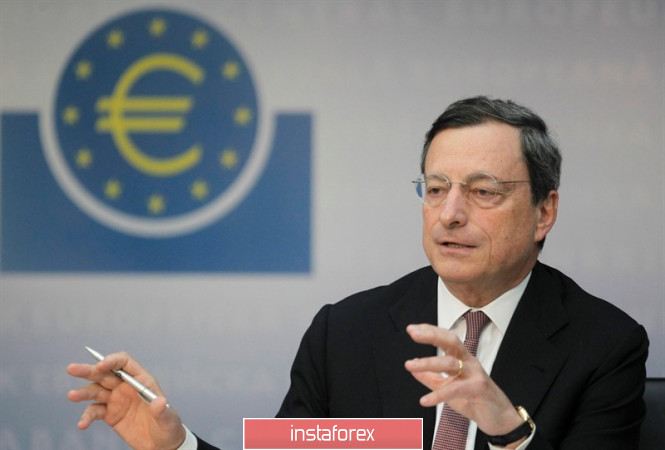
Amid uncertainty around Brexit (as well as in anticipation of the next ECB meeting and the release of data on business activity in the eurozone in October), the EUR/USD pair is falling for the third consecutive day, encountering resistance near the 1.1170 mark.
The British Parliament rejected the proposals of the government, designed to expedite the adoption of a "divorce" agreement with the European Union. However, UK Prime Minister Boris Johnson does not give up. He threatens Parliament with holding early elections, which would allow Conservatives to strengthen their positions and adopt the document without any problems. However, the Labour Party also has a chance to win, and in such a scenario all the efforts of the prime minister could be wasted.
The growth of political risks in the eurozone made it possible for bears on EUR/USD to move quotes to 1.11.
The growth of political risks in the eurozone allowed the EUR/USD bears to move quotes to 1.11.
Meanwhile, the economic situation in the EU still leaves much to be desired.
The European industry is currently experiencing the biggest problems. According to the latest data, industrial production in the eurozone in August fell by 2.8% in annual terms. At the same time, the economic prospects of the currency bloc are only getting worse, including due to trade wars.
Along with the unresolved issue of Brexit, the euro is under pressure because of the approaching deadline for US President Donald Trump to make a decision on tariffs on European cars. In May, the head of the White House set a six-month delay, but in November he must announce whether he will impose duties or not.
Data on European PMI indices for October will be published tomorrow, which according to preliminary estimates should show growth, but forecasts may not be justified, which will have a negative impact on the euro.
In addition, on Thursday, the ECB will hold a regular meeting on monetary policy, which will be the last for Mario Draghi as president of the central bank.

After the European regulator announced a new package of incentive measures in September, including a reduction in interest rates and a decision to restart the purchase of assets, now no one expects loud statements.
At the same time, there has been deep disagreement among the ECB Governing Council over the resumption of the quantitative easing (QE) program. This means that the last meeting of M. Draghi can become quite sharp.
Five key issues that may interest markets.
1. Will the ECB do something this week?
Given the fact that on September 12, the financial institute announced a large-scale incentive program, it is unlikely that this week it will take any additional measures.
Experts suggest that the upcoming meeting may raise technical issues regarding the resumption of the quantitative easing (QE) program and rate changes.
Issues regarding the impact of recent measures on the European economy may also be addressed. Low inflation expectations and concern that the regulator is running out of opportunities to stimulate it are taken into account.
The latter package of measures is unlikely to raise inflation in the eurozone to the target level, according to economists surveyed by Reuters. In their opinion, the risk of a recession in the region over the past two years has grown significantly.
2. Inside the ECB there is a deep division of opinions. What does this mean for politics?
An unprecedented split within the Governing Council threatens the ECB's monetary rate. More than a third of politicians, including the heads of the central banks of France and Germany, opposed the new asset purchase program.
For markets, such a split has become a sign that the ECB's capabilities are limited.
3. Will there be more detailed information about the new QE program?
The ECB will restart the purchase of assets in November, for which €20 billion will be allocated monthly.
Most likely, Draghi will mention this on Thursday, as the current scheme is similar to the previous round of measures, in which government bonds made up the bulk of purchases.
As two Reuters sources said, the ECB will do everything possible to ensure that the QE program lasts as long as possible.
4. Will the ECB clarify its rate plans?
Following the September meeting, the ECB lowered the deposit rate to -0.5% in order to protect the eurozone from recession.
Many economists believe that in December the regulator will again reduce the rate, but markets do not expect even a slight decrease until 2020.
If the ECB meeting on Thursday, Draghi will signal a readiness for an additional reduction of the rate by 0.1% later this year, then under such a scenario, the prospect of further easing of monetary policy will come into effect against the euro.
5. What will Draghi say at the end of his term as head of the ECB?
Earlier, the president of the ECB, under whose management the financial institution survived the eurozone debt crisis and launched QE, called on EU member states to use fiscal policy to stimulate the long-term growth of the European economy.
The same appeal may be made at the press conference of Draghi on Thursday. It is possible that the outgoing head of the ECB will want to complete his term on a more positive note.
The material has been provided by InstaForex Company - www.instaforex.com